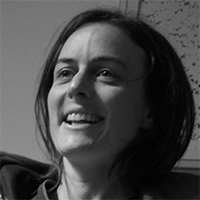 Celestial Bodies
Celestial Bodies
i
When you put Saturn in the bath
it floats.
It's true.
ii
A teaspoon full of neutron stars
weighs more than all the world's people
curled up together.
Under the sheets
we glow in the dark
but the light we emit is 1,000 times
dimmer than we can see with
naked eyes.
iii
We are skinny, you and me, and we weigh less
when the moon is directly above our heads.
Our moon is moving away from us
by 3.8cm every year.
Even very small celestial bodies
can have moons.
When an embryo is 3.8cm long
the uterus is the size of a warm grapefruit.
iv
It takes over 8 minutes for the sun's light
to land on the moon
bounce off
hit our bedroom wall and splash
onto the whites of your eyes
then leap
into my pupils.
The further away something is
the farther back in time it appears.
The nearest galaxy
looks as it did
when australopithecus hominid children
chewed on tubers and poked
at a fire with sticks.
v
Our bodies glow.
All the world's people
are lifted by the moon.
The smell of grapefruit.
A teaspoon full of fires.
Manuka smoke on my teeth.
The whites of the eyes
of the nearest galaxy.
A bath full of zigzag photons.
You are suddenly
close enough
to be in the same moment as me.
vi
When two pieces of the same type of metal
touch in space
they bond and become permanently stuck
together because they cannot tell themselves apart
from each other.
I don't like it
when you fall asleep
on top of me.
vii
The coldest part of the universe is on Earth
(in a lab in Massachusetts) and
we live inside the sun.
We live inside the sun.
This poem was first published in the Poetry New Zealand Yearbook 2017. The author was inspired to write the poem after watching an episode of QI (Quite Interesting) when she heard that "we live inside the sun."








